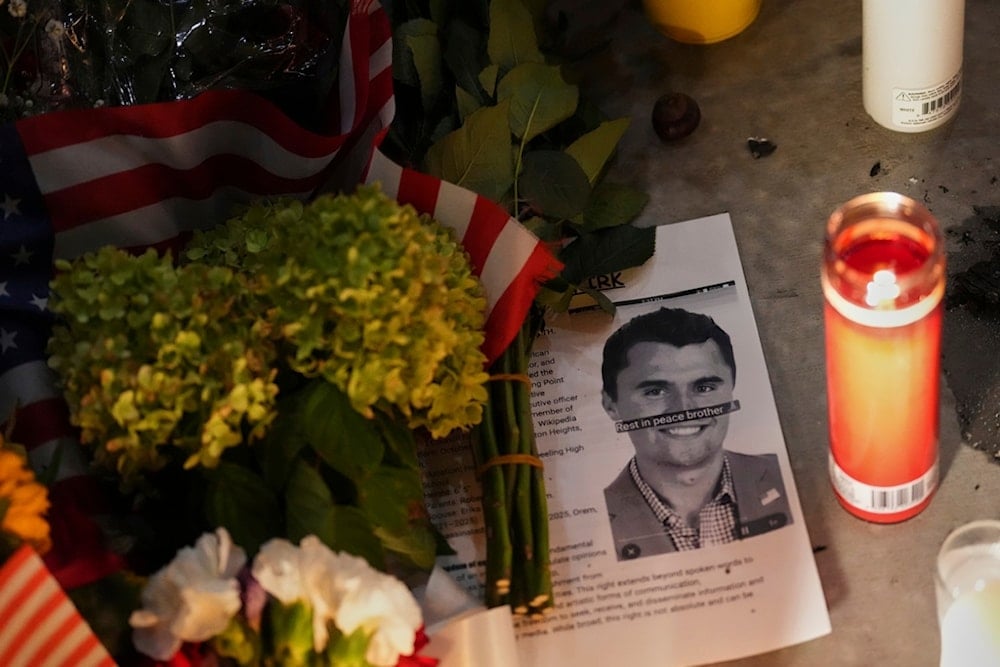US political violence hits highest level in decades, Bloomberg says
Bloomberg says political violence in the US has surged to its highest since the 1960s, with assassinations and attempts driven by deepening polarization.
-

A photo of Charlie Kirk, the CEO and co-founder of Turning Point USA, who was shot and killed, sits at a vigil in his memory, Thursday, September 11, 2025, in Orem, Utah. (AP)
Political violence in the United States has reached its highest level in more than half a century, with assassinations and attempts on politicians over the past five years outpacing records going back to the 1960s, according to a Bloomberg Geo-Economic analysis.
Drawing on data from the Violence Project, Bloomberg reported that since early 2021, there have been five assassinations or attempted assassinations targeting political figures, including two against then-presidential candidate Donald Trump in 2024. The findings follow the killing this week of conservative activist Charlie Kirk, a close Trump ally, during a Utah campus event.
“Political violence is the antithesis of a healthy democracy,” analysts Jennifer Welch and Martin Quick wrote in a Bloomberg research note. “Its causes belie easy explanations, and its perpetrators and victims cross ideological lines.”
The analysts identified intensifying partisan divides as a key driver behind the surge. Voteview data compiled at UCLA show that ideological distance between Democrats and Republicans in both chambers of Congress has steadily widened since the end of World War II.
“Polarization often goes hand-in-hand with political violence,” Welch and Quick warned. “The risk looking forward is violence may beget more violence.”
Kirk killing exposes void of unifying leader
The assassination of Charlie Kirk has drawn broad condemnation but highlighted the absence of a national leader able to calm tensions, Politico reported.
Former Indiana Governor Mitch Daniels said he could not identify anyone positioned to calm tensions. Bill Daley, a onetime chief of staff to President Barack Obama, told the outlet that only President Donald Trump “represents everyone,” while Rep. Don Bacon hoped Trump would rise to the moment, though “populists dwell on anger,” he noted.
Trump condemned the shooting at Utah Valley University in an Oval Office address, decrying the “demonizing” of opponents but also blaming “radical left lunatics” for vilifying Kirk, saying they compared him to "Nazis and the world’s worst mass murderers and criminals." The president’s history of incendiary rhetoric and threats against political foes has led some to question whether he can serve as "consoler-in-chief," as dubbed by Politico.
Trump demonizes but hates demonization
What Trump accuses the left of doing, which is demonizing Kirk, Trump himself has long done to his opponents and political foes, making long rants on social media and even threatening to hold back federal funding from certain causes with which he has ideological disagreements.
Civil rights leader William Barber told Politico that cooling today’s violence may require “presidents, pulpits, and politicians” rather than a single figure. Others, such as former Bush Press Secretary Ari Fleischer, argued that leadership can still rally the country, citing post-9/11 unity.
Past presidents issued statements urging peace. George W. Bush said violence must leave public life; Barack Obama called the attack “despicable,” and Bill Clinton urged Americans to debate “passionately, yet peacefully.”
Yet analysts told Politico that few public figures now command trust across ideological lines. Michael Wear, a former Obama faith advisor, said Kirk’s death exposed a shift in politics: leaders once sought to persuade beyond their base, but today many win praise for channeling anger at opponents.

 3 Min Read
3 Min Read








